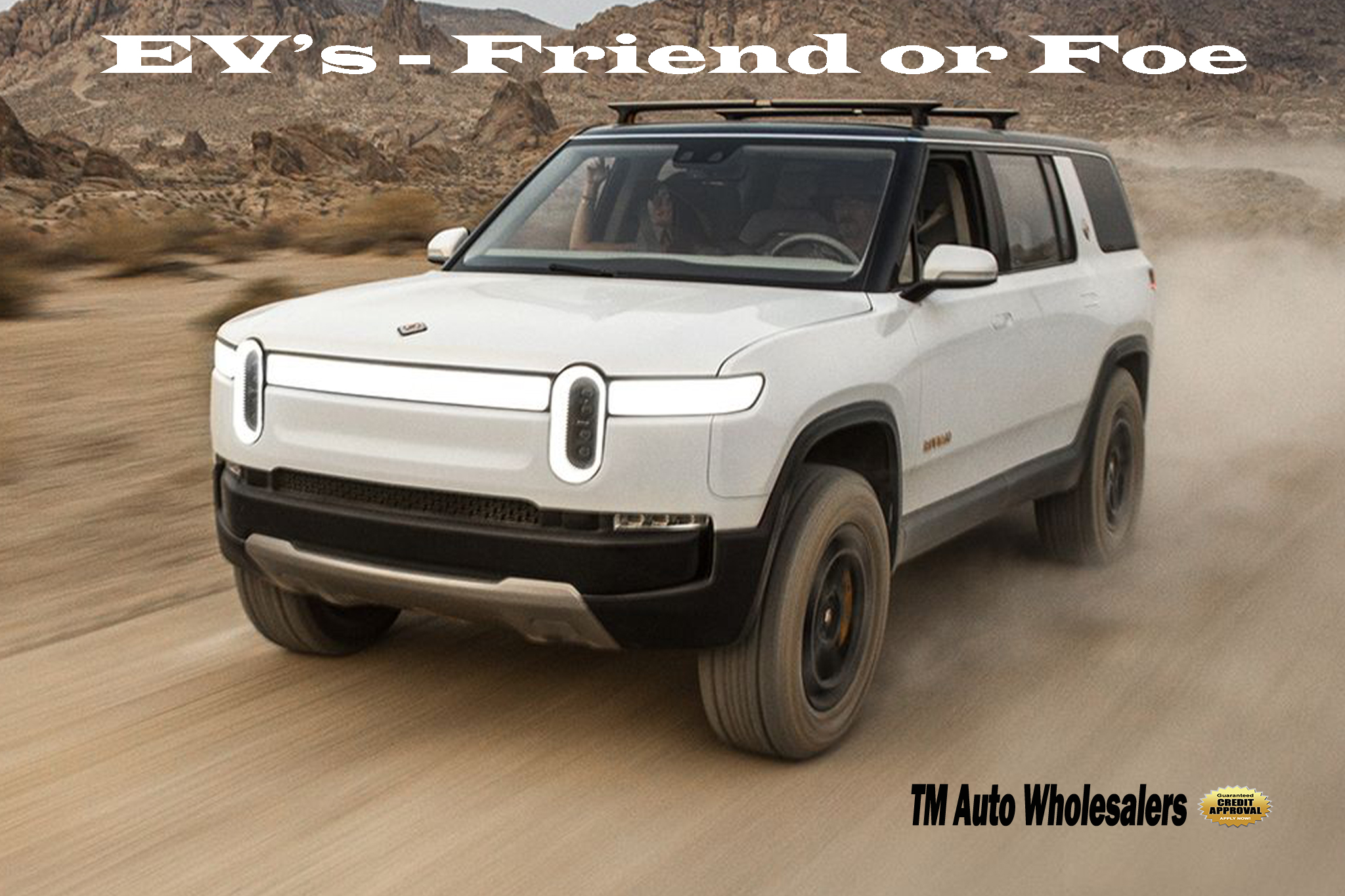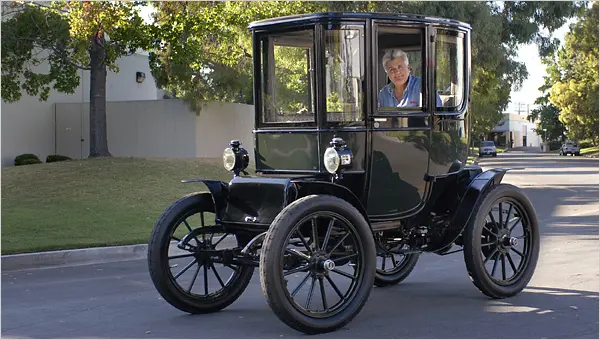 The question of electric cars pops up a few times a week with my customers nowadays. Though TM Auto deals in used cars and most EV’s are new, they’ve been on the road plenty long enough to be considered a used car option. Do they have the same horsepower? Will it really save me money? Are they really better for the environment? How about charging stations? There are lots of questions and as many doubts about electric cars as with any emerging tech. Honestly, I love my truck’s raw power and still get a charge from that familiar chug of a V8 engine. I also understand that change is sometimes a good thing so let’s take a look.
The question of electric cars pops up a few times a week with my customers nowadays. Though TM Auto deals in used cars and most EV’s are new, they’ve been on the road plenty long enough to be considered a used car option. Do they have the same horsepower? Will it really save me money? Are they really better for the environment? How about charging stations? There are lots of questions and as many doubts about electric cars as with any emerging tech. Honestly, I love my truck’s raw power and still get a charge from that familiar chug of a V8 engine. I also understand that change is sometimes a good thing so let’s take a look.
FACTS & STATS
The first electric car was manufactured in 1891. The rise in demand and popularity led to Baker Motor Company in Cleveland, OH becoming the largest electric car maker in the world (Jay Leno owns a “1909 Baker Electric”).

Jay Leno in his 1909 Baker Electric
The Baker Electric could travel 50 miles on a charge, had reusable batteries compliments of Thomas Edison, had a top speed of 23 mph, a key start unlike the Model T’s somewhat dangerous crank start, and filled the NYC streets. At an estimated cost of $1000 to $2500 there were about 15000 in the city at the time. Then as now the charging station became one of the centers of debate and by 1916 they were ousted as oil became increasingly available.
The electric car flourished early on but eventually fell prey to our beloved combustion autos, soon EV’s were pretty much forgotten. Well over 100 years ago the need for lowering noise and air pollutants was strong and today it’s still a heavily discussed topic. The kicker now is that oil isn’t the perfect forever source of energy as it appeared to be then and then there’s the environmental impact argument, so what do we know to be true and almost true 🙂
The EPA’s “Truths” about EVs
The U.S. Environmental Protection Agency (EPA) takes a pro EV view, providing the following facts as proof.
Electric vehicles typically have a smaller carbon footprint than gasoline cars, even when accounting for the electricity used for charging. “The amount varies widely based on how local power is generated, e.g., using coal or natural gas, which emit carbon pollution, versus renewable resources like wind or solar, which do not. Even accounting for these electricity emissions, research shows that an EV is typically responsible for lower levels of greenhouse gases (GHGs) than an average new gasoline car.”
The greenhouse gas emissions associated with an electric vehicle over its lifetime are typically lower than those from an average gasoline-powered vehicle, even when accounting for manufacturing. “Some studies have shown that making a typical electric vehicle (EV) can create more carbon pollution than making a gasoline car. This is because of the additional energy required to manufacture an EV’s battery. Still, over the lifetime of the vehicle, total greenhouse gas (GHG) emissions associated with manufacturing, charging, and driving an EV are typically lower than the total GHGs associated with a gasoline car. Recycling EV batteries can reduce the emissions associated with making an EV by reducing the need for new materials.”
Electric vehicles can be plugged into the same type of outlet as your toaster! When you need to charge while on the road, you’ll find over 45,000 stations in the U.S. available to the public. “Many people can meet their driving needs by plugging in only at home. Most electric vehicles (EVs) can be charged with a standard 120 V (Level 1) outlet. To charge the vehicle more quickly, you can install a dedicated 240 V (Level 2) outlet or charging system.”
Electric vehicle range is more than enough for typical daily use in the U.S. “Most EV models go above 200 miles on a fully-charged battery. EVs have sufficient range to cover a typical household’s daily travel, which is approximately 50 miles on average per day”
Electric vehicles must meet the same safety standards as conventional vehicles. “All light duty cars and trucks sold in the United States must meet the Federal Motor Vehicle Safety Standards. To meet these standards, vehicles must undergo an extensive, long-established testing process, regardless of whether the vehicle operates on gasoline or electricity.”
THE EV vs GAS PERFORMANCE STATS
Electric vehicles tend to have lower maintenance costs, as electric motors and batteries require less routine care than gasoline engines do. They don’t require regular oil changes, for instance but are typically more expensive upfront.
The EPA estimates that the electric Kia EV6 would cost $550 to fuel over the course of a year, while the gas-powered Kia K5 would cost $1950 to fuel. However, if all charging is done at public fast chargers, the annual costs to power our EV rises to $1850 per year, nearly equal to gas.
EV’s provide max torque at 0 mph, feels something like instant acceleration so are generally a bit quicker at 30-50 mph, but EVs fall short at top speed where gas power still rules. Torque is delivered right away, one of the benefits of electric cars.
This year the transportation department has approved electric vehicle charging station plans for all 50 states, Washington, D.C., and Puerto Rico covering roughly 75,000 miles of highways, indicating one every 50 miles. 500,000 EV charging stations by 2030 is a far leap from the 47,000 we have today.
Finally, gasoline cars win in the vehicle selection department with hundreds of options. There are currently only about 30 Purely electric car options available.
THE CROSSROADS
There are loads of pros and cons regarding EV’s and our understanding of them grows everyday. Knowing that General Motors has already publicly committed to putting 30 new electric vehicles on the market by 2025 and we’ve set a goal for EVs to make up 50% of total US car sales by 2030 tells us that change is on the way. The drive to build an emissions-free future is a long one, yet it does appear that the transportation sector is a giant when it comes to our US carbon footprint.
It’s being called “The Great Comeback” but we have a ways to go before announcing a new champ, only time will tell if EV’s deliver the knockout punch to end our combustion engine’s extraordinary reign.
Call or text (757) 560-4252 and ask for Mike Love, let me show you how easy a car buying experience can be.
Sources:
Bradshaw Nicole “Are Electric Vehicles Really Better for the Environment” Entergynewsroom.com Posted September 20, 2022 Web. Retrieved from: https://www.entergynewsroom.com/article/are-electric-vehicles-really-better-for-environment/
“1906 Baker Electric Car” Akronlife.com Web. Retrieved from: https://www.akronlife.com/arts-and-entertainment/1906-baker-electric-car/ Epa.gov “Electric Vehicle Myths”Epa.gov Post updated October 18, 2022 Web. Retrieved from: https://www.epa.gov/greenvehicles/electric-vehicle-myths
Newburger Emma “All 50 states get green light to build EV charging stations covering 75,000 miles of highways” CNBC.com PUBLISHED TUE, SEP 27 202212:40 PM EDT UPDATED TUE, SEP 27 20222:26 PM EDT Web. Retrieved from: https://www.cnbc.com/2022/09/27/ev-charging-stations-on-highways-dot-approves-50-states-plans.html
Capparella Joey “Electric Cars vs. Gas Cars: Everything You Need to Know” www.caranddriver.com PUBLISHED: AUG 8, 2022 Web. Retrieved from: https://www.caranddriver.com/research/a32781943/electric-cars-vs-gas-cars/



